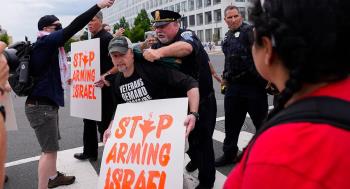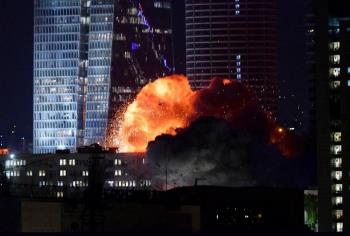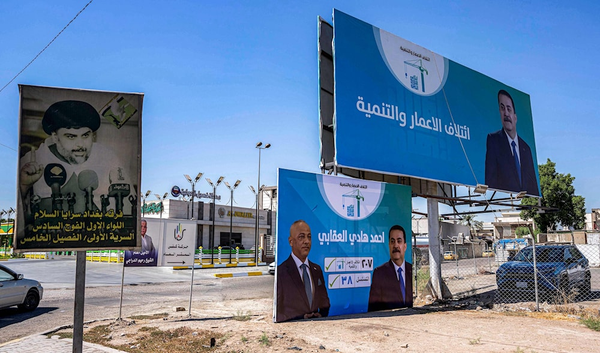Alwaght- The Iraqi parliamentary elections that are set for November 11 make a turning point in the country's political landscape. These elections are not only the sixth democratic experience after the collapse of the Baathist rule, but also given the fundamental changes in the electoral law, they can draw a new image to the political competitions and the composition of power in Baghdad.
Iraq's High Electoral Commission reported that over 1.25 million biometric voting cards have been distributed to voters, with the process continuing to ensure all eligible citizens can participate in the upcoming elections. Meanwhile, the Baghdad Operations Command conducted its first security simulation drill on Saturday to prepare for securing polling centers.
In these elections, approximately 29 million of Iraq's 46 million people are eligible to vote - an increase of about 4 million from the previous elections. Voting will be conducted by province using electoral lists, with any list securing at least 30,000 votes gaining a parliamentary seat. Iraq's parliament comprises 328 seats, including 83 reserved for women.
With one month remaining until the vote, political coalition-building has intensified. This cycle features 37 coalitions, 38 parties, and about 79 independent candidates competing for parliamentary seats.
According to Iraqi media reports, the "Reconstruction and Development Alliance" - considered by experts to be the most significant current electoral coalition - consists of 7 political groups including prominent figures such as former Prime Minister Ayad Allawi and Popular Mobilization Forces Commander Falih al-Fayyad. The coalition is positioned to compete for seats in both Shia and Sunni regions.
The State of Law Coalition led by ex-PM Nouri al-Maliki has entered the electoral race. The Al-Sadiqoon bloc, the political wing of Asa'ib Ahl al-Haq led by Qais al-Khazali, has also launched its campaign. The Wisdom Movement under Ammar al-Hakim has allied with Haider al-Abadi's Al-Nasr Coalition, forming the National Forces Alliance. The Badr Organization led by Hadi al-Amiri, like Al-Sadiqoon and State of Law, is competing without forming alliances with other prominent Shia groups.
Sunni coalitions include the Progress Alliance led by Mohammed al-Halbousi, the Sovereignty Alliance led by businessman Khamees al-Khanjar, and the Al-Azm Alliance led by Muthanna al-Samarrai.
Kurdish parties participating in the elections include the Kurdistan Democratic Party led by Masoud Barzani and the Patriotic Union of Kurdistan led by Bafel Talabani.
Different elections
The upcoming Iraqi elections with the new law and under the shadow of deep regional developments are expected to display a different image, an event that can upend the balance between the political forces, formation of the alliances, and the path of the next government in Baghdad and redefine the traditional power equations in Iraq.
The new election law, passed in March 2023, has introduced fundamental changes compared to previous cycles. The previous electoral system allowed voters to cast their ballots for party lists, with each party's share of seats determined by its total list votes. This system effectively favored large parties and traditional coalitions, which could leverage their organizational structures and extensive financial resources to secure a majority of parliamentary seats.
A key change was the reduction in the number of electoral districts. Instead of the 83 local constituencies under the old law, the country has returned to 18 provincial districts—one for each province. Consequently, under the reformed law, provinces serve as single constituencies, and voters can now vote directly for their preferred candidate, rather than just for a party list.
Furthermore, the new law has revoked certain legal advantages that were established after the 2019 protests to benefit independent candidates and smaller parties.
Influence of new law on the composition of seats of political factions
The shift from electoral districts to provincial constituencies, combined with the Sainte-Laguë proportional representation method, grants a distinct advantage to large parties and coalitions. To secure a seat, they must now amass a large number of votes across an entire province, rather than focusing on smaller local districts. This system is likely to benefit prominent candidates who, while lacking deep local popularity, command a stronger base of support at the provincial level.
In contrast, smaller and independent movements, which previously could win seats by mobilizing limited local electorates, now face significant pressure. Competing across entire provinces against parties with superior financial, media, and organizational resources presents a far greater challenge.
Consequently, the parliament's composition is expected to shift towards a consolidation of power among traditional blocs and influential parties, particularly those with robust organizational structures or broad social appeal. While some independents and emerging forces with strong province-wide campaigns may still succeed, the odds are increasingly difficult.
Moreover, the enlargement of electoral districts will likely render the scattered votes of smaller movements ineffective. Individuals who previously entered parliament on strong local support may now fail to meet the necessary vote threshold within a province.
In summary, while Iraq's new electoral law ostensibly emphasizes fair representation, it has, in practice, tilted the playing field in favor of large parties. The upcoming elections under this framework are likely to produce a more concentrated parliament, where power remains predominantly in the hands of the major Shia, Sunni, and Kurdish coalitions. These blocs are expected to secure the vast majority of seats, thereby narrowing the path for independent figures and smaller parties.
These reforms are ostensibly aimed at increasing the electoral justice and preventing power monopoly, but in practice they can carry different implications to the country's political future.
The new law is neither completely in favor of small parties and group note is or serving the large parties. It actually has made a different ground the outcome of which more than any thing influences the quality of organizing, individual popularity of candidates, and their capability to mobilize voters.
Challenges remain in place
Despite efforts by the government and political factions to hold a arrange election, significant challenges remain in place. These include weak supervision institutions, the potential for an election boycott by disqualified figures, and persistent concerns over foreign interference. Past elections have demonstrated that the final results are consistently contested, casting a shadow over the legislature's legitimacy.
Meanwhile, the US and regional powers are closely monitoring Iraq's developments, seeking to shape the country's future political trajectory to their advantage. Recent reports indicate active efforts by the US, Turkey, and Saudi Arabia to influence the electoral process and secure parliamentary seats for their preferred allies. From this perspective, the upcoming vote is not merely an internal contest but a critical part of the broader power struggle in a West Asia that has undergone unprecedented shifts in the last two years.
The election's outlook, in the view of political observers, is ambiguous yet fateful. High voter turnout and a transparent process could lead to a more balanced parliament and an effective government. However, if the election is marred by public distrust and external meddling, it risks recreating past political crises and could lead to significant delays in forming a new government.
This election is not merely a competition among the country's political currents, but also it is a decisive test in the context of regional equations. The outcome can determine the Iraqi future path, to an extent that in case of the victory of the Shia factions and their allies, the country will become a center for convergence and stability, but if the foreign pawns rise to power, sectarian gaps are expected to increase and foreign powers will find opportunity for expanded influence in the Iraqi security and political structures.



























